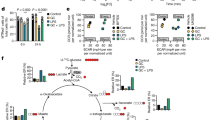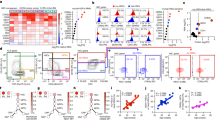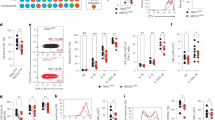Abstract
Atherosclerosis and post-transplant graft arteriosclerosis are both characterized by expansion of the arterial intima as a result of the infiltration of mononuclear leukocytes, the proliferation of vascular smooth muscle cells (VSMCs) and the accumulation of extracellular matrix1,2,3. They are also associated with the presence of the immunomodulatory cytokine interferon-γ (IFN-γ)2,3. Moreover, in mouse models of atheroma formation or allogeneic transplantation, the serological neutralization4 or genetic absence5,6,7,8 of IFN-γ markedly reduces the extent of intimal expansion. However, other studies have found that exogenous IFN-γ inhibits cultured VSMC proliferation9,10,11,12,13,14 and matrix synthesis15, and reduces intimal expansion in response to mechanical injury16,17,18. This discrepancy is generally explained by the idea that IFN-γ either directly activates macrophages, or, by increasing antigen presentation, indirectly activates T cells within the lesions of atherosclerosis and graft arteriosclerosis. These activated leukocytes are thought to express the VSMC-activating cytokines1,2,3 and cell-surface molecules19 that cause the observed arteriosclerotic responses. Here we have inserted pig and human arteries into the aorta of immunodeficient mice, and we show that IFN-γ can induce arteriosclerotic changes in the absence of detectable immunocytes by acting on VSMCs to potentiate growth-factor-induced mitogenesis.
This is a preview of subscription content, access via your institution
Access options
Subscribe to this journal
Receive 51 print issues and online access
$199.00 per year
only $3.90 per issue
Buy this article
- Purchase on Springer Link
- Instant access to full article PDF
Prices may be subject to local taxes which are calculated during checkout





Similar content being viewed by others
References
Ross, R. Atherosclerosis—an inflamatory disease. N. Engl. J. Med. 340, 115–126 (1999).
Hansson, G. K., Jonasson, L., Seifert, P. S. & Stemme, S. Immune mechanisms in atherosclerosis. Arteriosclerosis 9, 567–578 (1989).
Libby, P., Salomon, R. N., Payne, D. D., Schoen, F. J. & Pober, J. S. Functions of vascular wall cells related to development of transplantation-associated coronary arteriosclerosis. Transplant. Proc. 21, 3677–3684 (1989).
Russell, P. S., Chase, C. M., Winn, H. J. & Colvin, R. B. Coronary atherosclerosis in transplanted mouse hearts. III. Effects of recipient treatment with a monoclonal antibody to interferon-γ. Transplantation 57, 1367–1371 (1994).
Gupta, S. et al. IFN-γ potentiates atherosclerosis in ApoE knock-out mice. J. Clin. Invest. 99, 2752–2761 (1997).
Nagano, H. et al. Interferon-γ deficiency prevents coronary arteriosclerosis but not myocardial rejection in transplanted mouse hearts. J. Clin. Invest. 100, 550–557 (1997).
Räisänen-Sokolowski, A., Glysing-Jensen, T., Koglin, J. & Russell, M. E. Reduced transplant arteriosclerosis in murine cardiac allografts placed in interferon-γ knockout recipients. Am. J. Pathol. 152, 359–365 (1998).
Nagano, H. et al. Coronary arteriosclerosis after T-cell-mediated injury in transplanted mouse hearts. Role of interferon-γ. Am. J. Pathol. 152, 1187–1197 (1998).
Hansson, G. K., Jonasson, L., Holm, J., Clowes, M. M. & Clowes, A. W. γ-Interferon regulates vascular smooth muscle proliferation and Ia antigen expression in vivo and in vitro. Circ. Res. 63, 712–719 (1988).
Warner, S. J. C., Friedman, G. B. & Libby, P. Immune interferon inhibits proliferation and induces 2′-5′-oligoadenylate synthetase gene expression in human vascular smooth muscle cells. J. Clin. Invest. 83, 1174–1182 (1989).
Hansson, G. K., Hellstrand, M., Rymo, L., Rubbia, L. & Gabbiani, G. Interferon γ inhibits both proliferation and expression of differentiation-specific α-smooth muscle actin in arterial smooth muscle cells. J. Exp. Med. 170, 1595–1608 (1989).
Shimokado, K. & Numano, F. Inhibition of human vascular smooth muscle cell proliferation by interferon gamma. Ann. N. Y. Acad. Sci. 598, 544–545 (1990).
Nunokawa, Y. & Tanaka, S. Interferon-γ inhibits proliferation of rat vascular smooth muscle cells by nitric oxide generation. Biochem. Biophys. Res. Commun. 188, 409–415 (1992).
Bennett, M. R., Evan, G. I. & Newby, A. C. Deregulated expression of the c-myc oncogene abolishes inhibition of proliferation of rat vascular smooth muscle cells by serum reduction, interferon-γ, heparin, and cyclic nucleotide analogues and induces apoptosis. Circ. Res. 74, 525–536 (1994).
Amento, E. P., Ehsani, N., Palmer, H. & Libby, P. Cytokines and growth factors positively and negatively regulate interstitial collagen gene expression in human vascular smooth muscle cells. Arterioscler. Thromb. 11, 1223–1230 (1991).
Hansson, G. K. & Holm, J. Interferon-γ inhibits arterial stenosis after injury. Circulation 84, 1266–1272 (1991).
Hansson, G. K. et al. T lymphocytes inhibit the vascular response to injury. Proc. Natl Acad. Sci. USA 88, 10530–10534 (1991).
Castronuovo, J. J. et al. Cytokine therapy for arterial restenosis: inhibition of neointimal hyperplasia by gamma-interferon. Cardiovasc. Surg. 3, 463–468 (1995).
Mach, F., Schönbeck, U., Sukhova, G. K., Atkinson, E. & Libby, P. Reduction of atherosclerosis in mice by inhibition of CD40 signalling. Nature 394, 200–203 (1998).
Sultan, P. et al. Pig but not human interferon-γ initiates human cell-mediated rejection of pig tissue in vivo. Proc. Natl Acad. Sci. USA 94, 8767–8772 (1997).
Groenewegen, G., Buurman, W. A. & van der Linden, C. J. Lymphokine dependence of in vivo expression of MHC class II antigens by endothelium. Nature 316, 361–363 (1985).
Goes, N., Urmson, J., Hobart, M. & Halloran, P. F. The unique role of interferon-γ in the regulation of MHC expression on arterial endothelium. Transplantation 62, 1889–1894 (1996).
Suzuki, H. et al. Interferon-γ modulates messenger RNA levels of c-sis (PDGF-B chain), PDGF-A chain, and IL-1β genes in human vascular endothelial cells. Am. J. Pathol. 134, 35–43 (1989).
Yokota, T. et al. Mitogenic activity of interferon gamma on growth-arrested human vascular smooth muscle cells. Arterioscler. Thromb. 12, 1393–1401 (1992).
Mensink, A. et al. Modulation of intercellular communication between smooth muscle cells by growth factors and cytokines. Eur. J. Pharmacol. 310, 73–81 (1996).
Brinckerhoff, C. E. & Guyre, P. M. Increased proliferation of human synovial fibroblasts treated with recombinant immune interferon. J. Immunol. 134, 3142–3146 (1985).
Hunninghake, G. W., Hemken, C., Brady, M. & Monick, M. Immune interferon is a growth factor for human lung fibroblasts. Am. Rev. Respir. Dis. 134, 1025–1028 (1986).
Yong, V. W. et al. γ-Interferon promotes proliferation of adult human astrocytes in vitro and reactive gliosis in the adult mouse brain in vivo. Proc. Natl Acad. Sci. USA 88, 7016–7020 (1991).
Marra, F., Choudhury, G. G. & Abboud, H. E. Interferon-γ-mediated activation of STAT1α regulates growth factor-induced mitogenesis. J. Clin. Invest. 98, 1218–1230 (1996).
Lorber, M. I. et al. Human allogeneic vascular rejection after arterial transplantation and peripheral lymphoid reconstitution in severe combined immunodeficient mice. Transplantation 67, 897–903 (1999).
Acknowledgements
This work was supported by grants from the American Heart Association (G.T.) and the NIH (J.S.P.). R.W.K. received a fellowship award for the Thoracic Surgery Foundation for Research and Education, and J.S.S. was supported by a career development award from the Dermatology Foundation.
Author information
Authors and Affiliations
Corresponding author
Rights and permissions
About this article
Cite this article
Tellides, G., Tereb, D., Kirkiles-Smith, N. et al. Interferon-γ elicits arteriosclerosis in the absence of leukocytes. Nature 403, 207–211 (2000). https://doi.org/10.1038/35003221
Received:
Accepted:
Issue Date:
DOI: https://doi.org/10.1038/35003221
This article is cited by
-
Vascular damage in systemic lupus erythematosus
Nature Reviews Nephrology (2024)
-
A ZFYVE21-Rubicon-RNF34 signaling complex promotes endosome-associated inflammasome activity in endothelial cells
Nature Communications (2023)
-
Bone marrow endothelial dysfunction promotes myeloid cell expansion in cardiovascular disease
Nature Cardiovascular Research (2021)
-
The role of interferon-γ in cardiovascular disease: an update
Inflammation Research (2020)
-
Tumour ischaemia by interferon-γ resembles physiological blood vessel regression
Nature (2017)
Comments
By submitting a comment you agree to abide by our Terms and Community Guidelines. If you find something abusive or that does not comply with our terms or guidelines please flag it as inappropriate.



